Text
AFRICAN SONGS SANG DURING SLAVE TRADES
Out on all platforms
#life#animals#culture#aesthetic#black history#history#blm blacklivesmatter#anime and manga#architecture#black community
36 notes
·
View notes
Text
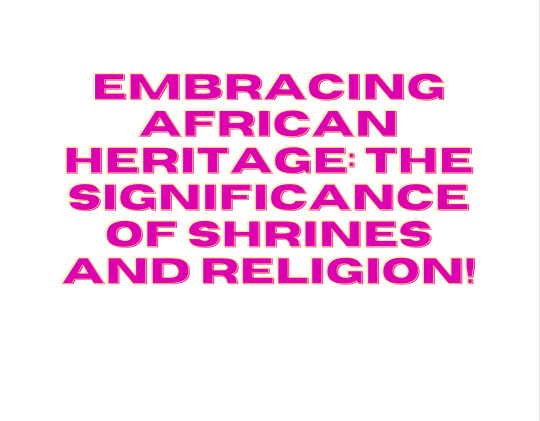
Embracing African Heritage: The Significance of Shrines and Religion
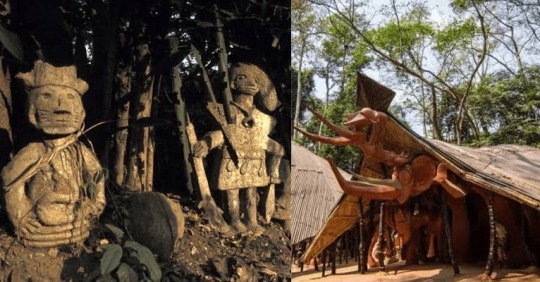
Africa, often referred to as the cradle of humanity, boasts a rich tapestry of cultures, traditions, and spiritual beliefs that have endured for millennia. Central to this heritage are the sacred shrines and profound religious practices that serve as pillars of community, identity, and connection to the divine.
Shrines, both natural and constructed, hold a special place in African spirituality. These sites are often nestled in the heart of communities or hidden within the vast landscapes of the continent. From the iconic pyramids of Egypt to the humble groves of the Yoruba in Nigeria, each shrine reflects a unique blend of history, mythology, and reverence for the ancestors.
One of the fundamental aspects of African religion is the veneration of ancestors. Ancestral shrines serve as focal points for prayers, offerings, and rituals aimed at honoring those who came before. These ancestors are believed to possess wisdom, guidance, and protection, and their spirits are invoked for blessings and assistance in times of need. In many African societies, the bond between the living and the dead is deeply cherished, with rituals and ceremonies reinforcing the interconnectedness of past, present, and future generations.
Moreover, African shrines are often associated with specific deities or spirits, each embodying different aspects of the natural world or human experience. Whether it's Oshun, the Yoruba goddess of love and fertility, or Anubis, the ancient Egyptian god of the afterlife, these divine entities are revered through elaborate ceremonies, dances, and sacrifices. Through these rituals, devotees seek communion with the divine and seek guidance in matters of health, prosperity, and spiritual growth.
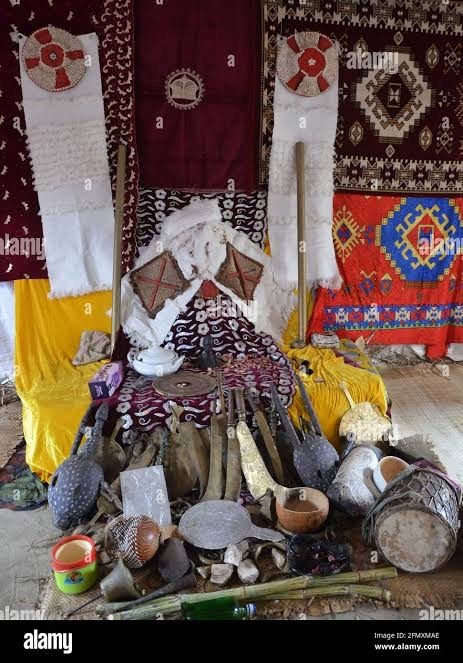
However, the significance of African shrines extends beyond the realm of spirituality. They are also repositories of cultural knowledge, oral traditions, and historical narratives passed down through generations. Within the sacred precincts of these sites, elders impart wisdom, storytellers weave tales of heroism and creation, and artists imbue their craft with symbols and motifs that speak to the essence of African identity.
Unfortunately, the colonial era and the spread of Christianity and Islam have often marginalized indigenous African religions, dismissing them as primitive or pagan. Despite this, many communities continue to uphold their traditional beliefs, adapting them to the challenges of modernity while preserving their core values and rituals. In recent years, there has been a renewed interest in African spirituality, fueled by a desire to reclaim cultural heritage and reconnect with ancestral roots.
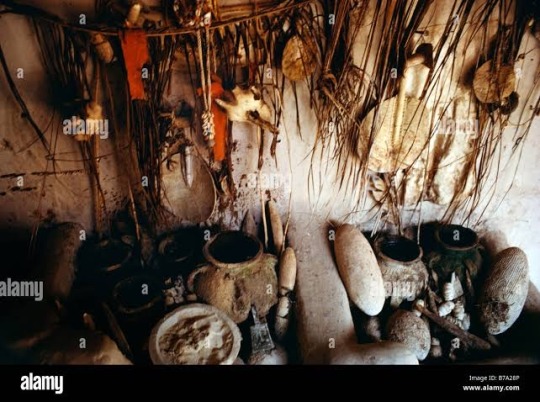
In conclusion, African shrines and religion embody the resilience, diversity, and spirituality of the continent's people. They are more than just places of worship; they are living testaments to the enduring legacy of Africa's past and the enduring power of its traditions. As we navigate an increasingly interconnected world, embracing and honoring Africa's rich heritage is not only a matter of cultural preservation but also a celebration of the human spirit's boundless capacity for faith, creativity, and reverence for the divine.
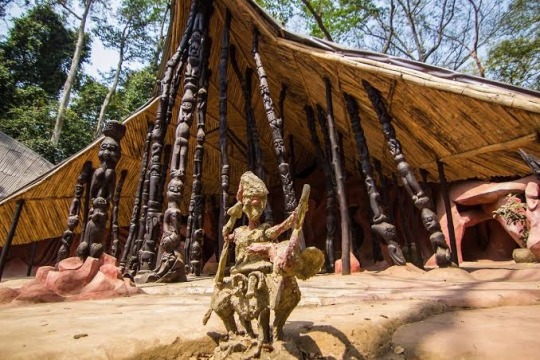
#life#animals#culture#aesthetic#black history#history#blm blacklivesmatter#anime and manga#architecture#black community
56 notes
·
View notes
Text
HAPPY BLACK HISTORY MONTH
From the black history story teller
From Nigeria 🇳🇬
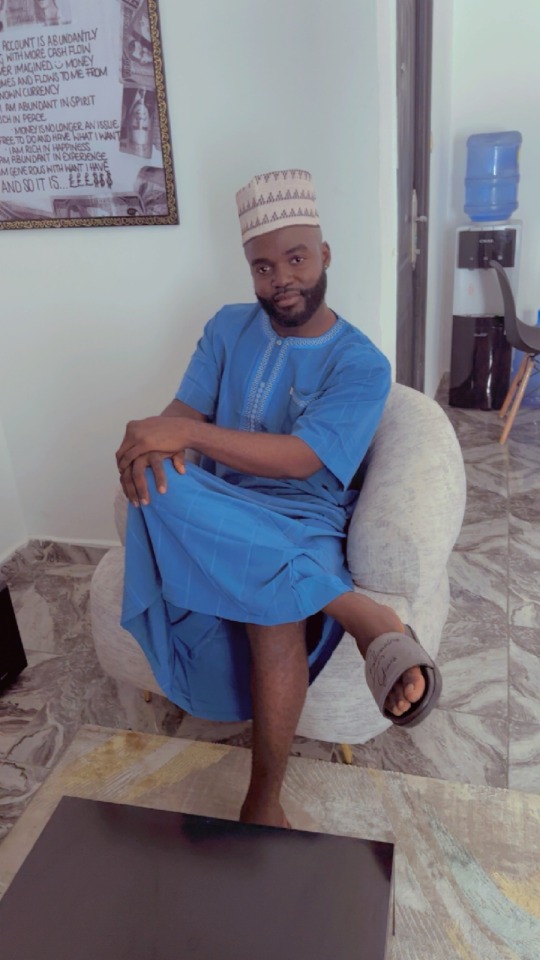

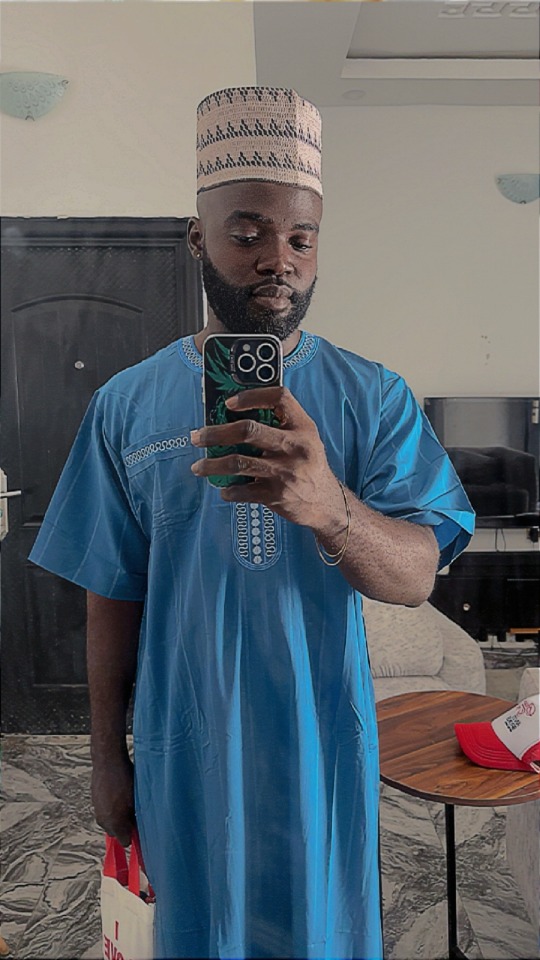
#blm blacklivesmatter#life#animals#culture#aesthetic#black history#history#anime and manga#architecture#black community#black history month
9 notes
·
View notes
Text
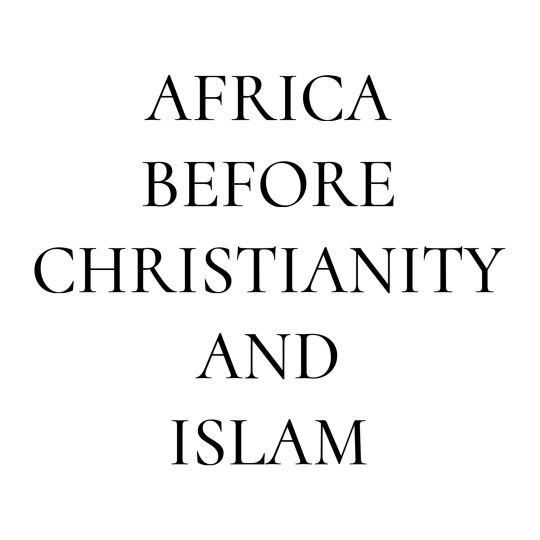
Africa has been very rich even before colonialism
The truth you should know about African
Blacks know your history and divinity
They gave us the Bible and stole our natural resources
Community and Social Cohesion: Traditional African religions often emphasized communal values, fostering a sense of belonging and mutual support within the community. Rituals and ceremonies were communal events that strengthened social ties.
Respect for Nature: Many African traditional religions were deeply connected to nature, promoting a harmonious relationship with the environment. This connection often led to sustainable practices and a respect for the natural world.
Ethical Guidelines: These religions often included moral and ethical guidelines that governed interpersonal relationships. Concepts such as honesty, hospitality, and respect for elders were commonly emphasized.
Cultural Identity: Traditional African religions played a crucial role in shaping cultural identity. They provided a framework for understanding the world, explaining origins, and passing down cultural practices through rituals, myths, and oral traditions.
Islam reached Nigeria through a combination of trade, migration, and cultural interactions. The trans-Saharan trade routes were crucial in bringing Islam to the region. Muslim traders from North Africa and the Middle East ventured into West Africa, establishing economic ties and introducing Islam to local communities.
The city-states along the trade routes, such as Kano and Katsina, became significant centers for Islamic influence. Merchants not only engaged in commercial activities but also played a role in spreading Islamic teachings. Over time, rulers and elites in these city-states embraced Islam, contributing to its gradual acceptance.
Additionally, the spread of Islam in Nigeria was facilitated by the activities of Islamic scholars and missionaries. Scholars known as clerics or Mallams played a key role in teaching Islamic principles and converting people to Islam. They often established Quranic schools and engaged in educational activities that promoted the understanding of Islamic teachings.
Military conquests also played a part in the expansion of Islam in Nigeria. Islamic empires, such as the Sokoto Caliphate in the 19th century, emerged through conquest and warfare, bringing Islam to new territories. The Sokoto Caliphate, led by Usman dan Fodio, sought to establish a strict Islamic state based on Sharia law.
Overall, the spread of Islam in Nigeria was a gradual process influenced by trade networks, migration, the activities of scholars, and, at times, military expansion. The interplay of these factors contributed to the integration of Islam into Nigerian society, shaping its cultural and religious landscape.
In the vast tapestry of Africa's rich cultural heritage, herbal traditional healing stands out as a profound and time-honored practice. African herbal traditional healers, often known as traditional or indigenous healers, play a vital role in the healthcare systems of many communities across the continent. Their practices are deeply rooted in the natural world, drawing on centuries-old wisdom and an intimate understanding of local flora.
African herbal traditional healers are custodians of ancient knowledge, passing down their expertise through generations. They serve as primary healthcare providers in many communities, addressing a wide range of physical, mental, and spiritual ailments. The healing process involves a holistic approach, considering the interconnectedness of the individual with their community and environment.
One of the hallmark features of African herbal traditional healers is their profound knowledge of medicinal plants. These healers have an intricate understanding of the properties, uses, and combinations of various herbs. Passed down through oral traditions, this knowledge is often a well-guarded family secret or shared within the apprentice-master relationship.
The methods employed by herbal traditional healers encompass diverse approaches. Herbal remedies, administered as infusions, decoctions, or ointments, form a significant part of their treatment. These remedies are carefully crafted based on the healer's understanding of the patient's symptoms, lifestyle, and spiritual condition. Additionally, rituals, ceremonies, and prayers are often incorporated into the healing process, acknowledging the interconnectedness of physical and spiritual well-being.
African herbal traditional healers frequently integrate spiritual elements into their practice. They believe that illness can be a manifestation of spiritual imbalances or disharmony. Through rituals and consultations with ancestors or spirits, healers seek to restore balance and harmony within the individual and the community.
Herbal traditional healers are integral to the social fabric of their communities. They often serve not only as healers but also as counselors, mediators, and keepers of cultural traditions. Their practices are deeply intertwined with community life, contributing to the resilience and cohesion of African societies.
While herbal traditional healing holds immense value, it faces challenges in the modern era. The encroachment of Western medicine, issues related to regulation and standardization, and the potential exploitation of traditional knowledge pose threats to this practice. However, there is also a growing recognition of the importance of integrating traditional healing into mainstream healthcare systems, leading to collaborative efforts to preserve and promote this valuable heritage.
African herbal traditional healers are bearers of an ancient legacy, embodying a profound connection between humanity and the natural world. Their healing practices, rooted in herbal wisdom and spiritual insights, offer a unique perspective on healthcare that complements modern medical approaches. Preserving and respecting the knowledge of these healers is not only crucial for the well-being of local communities but also for the broader appreciation of the diverse cultural tapestry that defines Africa.
#life#animals#culture#aesthetic#black history#history#blm blacklivesmatter#anime and manga#architecture#black community
120 notes
·
View notes
Text
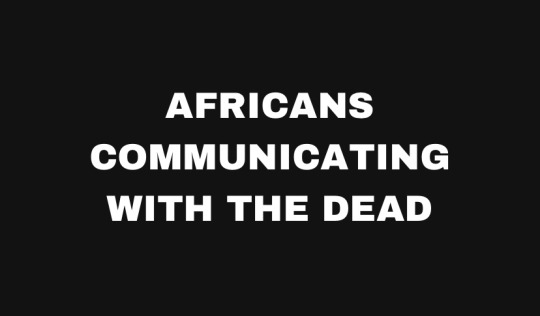
This is an article about Africans and communicating with the dead
African communication with the deceased is often rooted in rich cultural and spiritual traditions that vary across the diverse continent. These practices are deeply ingrained in the belief systems of different African communities, reflecting a connection between the living and the spiritual realm. While it's crucial to recognize the diversity of African cultures, we can explore some common themes in the ways various communities communicate with the departed.
One prevalent aspect of African spirituality involves ancestor veneration. Many African societies believe that the spirits of ancestors continue to play a role in the lives of their descendants. Communication with ancestors is often seen as a means to seek guidance, protection, and blessings. Rituals and ceremonies, such as libations, prayers, or offerings, are performed to honor and connect with these ancestral spirits.
Divination is another practice found in various African cultures, serving as a channel for communicating with the spirit world. Diviners, who are often regarded as intermediaries between the living and the spiritual realm, employ various methods such as casting lots, reading patterns, or interpreting signs and symbols to gain insights from the ancestors. This process is not only a form of seeking guidance but also a way of maintaining a harmonious relationship with the spirit world.
In some African belief systems, the concept of death is not viewed as the end but as a transition to another existence. As a result, individuals may engage in ceremonies to celebrate the lives of the departed and maintain a connection with them. These celebrations can include dances, music, and feasts, creating a communal space where the living and the dead are believed to come together.
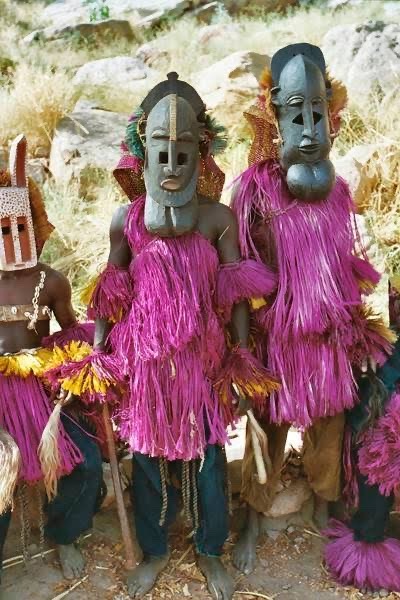
The use of mediums or spiritual leaders is prevalent in certain African societies for communicating with the deceased. These individuals are thought to possess a heightened spiritual sensitivity, enabling them to bridge the gap between the earthly and spiritual realms. Through trance, visions, or other altered states of consciousness, these mediums convey messages from the deceased to their living relatives.
It's essential to approach these practices with cultural sensitivity and respect, recognizing that interpretations and rituals may vary widely among African communities. The communication with the dead in Africa is deeply intertwined with cultural heritage, spirituality, and the understanding of life and death within each distinct society.
Another significant aspect of communication with the dead in various African cultures involves rituals associated with death and burial. Funerals are often elaborate ceremonies that not only serve as a farewell to the departed but also as a way to facilitate their transition to the afterlife. Practices during funerals can include reciting prayers, performing symbolic rites, and sometimes even engaging in dances to honor the deceased.

Dreams are considered powerful conduits for communication with the spirit world in many African societies. Dreams are believed to be a realm where the living can connect with the departed, receiving messages or guidance. Consequently, individuals may place great importance on dream interpretation, seeking insights into the wishes or concerns of those who have passed away.
Certain African communities practice the creation of memorial objects or ancestral altars. These tangible items, such as photographs, personal belongings, or symbolic artifacts, are believed to serve as a focal point for spiritual connection. Families may engage in ceremonies around these objects to maintain a spiritual link with their ancestors, fostering a sense of continuity and familial unity.
It's crucial to note that the diversity across Africa results in a wide array of beliefs and practices regarding communication with the dead. While some communities may place emphasis on rituals and ceremonies, others may have more private and personal approaches to maintaining a connection with the deceased.
In exploring African communication with the dead, it becomes evident that these practices are deeply intertwined with cultural identity, spirituality, and a profound respect for the continuity of life beyond the physical realm. They highlight the richness and diversity of African traditions, emphasizing the importance of understanding and appreciating the complexities within each unique cultural context.

#life#animals#culture#aesthetic#black history#history#blm blacklivesmatter#anime and manga#architecture#black community
82 notes
·
View notes
Text
Title: "Exploring African Hunting Culture: Traditions, Challenges, and Conservation
Introduction:
African hunting culture is a rich and diverse tapestry that weaves through the continent's history, ecology, and societies. Rooted in centuries-old traditions, it encompasses a wide range of practices, from subsistence hunting for survival to trophy hunting as a sport. This article delves into the multifaceted world of African hunting culture, highlighting its cultural significance, the challenges it faces, and the ongoing efforts for conservation.
A Rich Tapestry of Traditions:
Africa is home to a vast array of ethnic groups, each with its own unique hunting traditions. These practices are deeply intertwined with local customs, beliefs, and spirituality. For many indigenous communities, hunting is not just a means of acquiring food but a vital cultural expression. The use of traditional hunting tools and techniques, like spears, bows, and traps, continues to be an essential part of their heritage.

Subsistence Hunting:
Subsistence hunting is a common practice across the African continent. In rural areas, where access to commercial sources of food may be limited, hunting provides a vital source of protein and sustenance. Communities rely on their knowledge of the land and wildlife to harvest game responsibly, ensuring the sustainability of their resources. This balance between nature and necessity underscores the importance of respecting wildlife for survival.
Trophy Hunting:

Trophy hunting, a more controversial aspect of African hunting culture, involves the pursuit and killing of animals for sport and the collection of trophies, such as horns or skins. While it can generate revenue for local communities and conservation efforts, it has also faced criticism for ethical and conservation reasons. Many African countries have implemented strict regulations to manage and monitor trophy hunting to mitigate negative impacts on wildlife populations.
Conservation Challenges:
African wildlife has faced significant challenges due to habitat loss, poaching, and the illegal wildlife trade. The intricate relationship between hunting culture and conservation is evident in the struggle to protect endangered species while acknowledging the cultural importance of hunting. Conservation organizations work tirelessly to strike a balance by implementing measures to protect threatened species and their habitats.
Modern Influences:

In the modern era, African hunting culture has been influenced by global forces. Tourism, including wildlife safaris, has become a booming industry, providing alternatives to traditional hunting practices and contributing to conservation efforts. Additionally, changing perceptions of hunting, both locally and globally, have prompted a reevaluation of hunting practices and their impact on ecosystems.
Conservation Efforts:
Across the continent, initiatives to conserve African wildlife are gaining momentum. National parks, reserves, and private conservancies play a crucial role in safeguarding habitats and species. Anti-poaching efforts, community-based conservation programs, and responsible hunting practices have emerged as essential strategies to ensure the sustainability of African ecosystems.
African hunting culture is a multifaceted and evolving aspect of the continent's heritage. While it carries deep cultural significance and provides for many communities, it also faces challenges related to conservation and ethical considerations. Striking a balance between cultural preservation, sustainability, and responsible hunting practices is an ongoing process, guided by a commitment to protect Africa's remarkable biodiversity for generations to come.
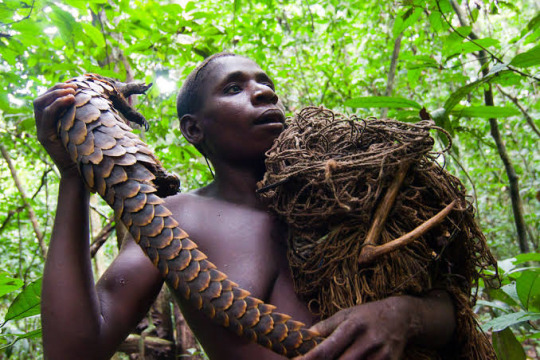
Hunting practices among African tribes vary widely depending on the specific region, culture, and available resources. Traditional hunting methods are often passed down through generations and are adapted to the local environment and the animals being pursued. Here are some common hunting techniques employed by various African tribes:
1. **Spear Hunting:** Spear hunting is one of the oldest and most widespread hunting methods in Africa. Tribes such as the Maasai in East Africa are known for their skill in using spears to hunt animals like lions and giraffes. This method requires getting close to the prey and using a well-aimed throw or thrust to kill it.
2. **Bow and Arrow:** The use of bows and arrows is prevalent among many African tribes. The San people, for example, are known for their exceptional tracking skills and proficiency in hunting with poisoned arrows. This method allows hunters to maintain some distance from their prey.
3. **Traps and Snares:** Various tribes set up traps and snares to catch small to medium-sized game. These can be constructed from natural materials like branches, vines, and ropes. When an animal triggers the trap, it captures the prey.

4. **Pitfalls:** Some tribes dig pits and cover them with branches and leaves to create pitfalls for animals. Once an animal falls into the pit, it becomes trapped and can be killed by the hunters.
5. **Hunting Dogs:** In some regions, like the central African rainforests, tribes use hunting dogs to track and corner prey. The hunters then finish the job using spears or other weapons.
6. **Blow Darts:** Certain tribes, like the Pygmies in Central Africa, use blow darts with poison-tipped tips to silently kill small game and birds.
7. **Net Hunting:** Nets are used by several tribes to encircle and capture birds, small mammals, and even fish in rivers and lakes. The nets can be set up in a variety of ways to suit the hunting environment.
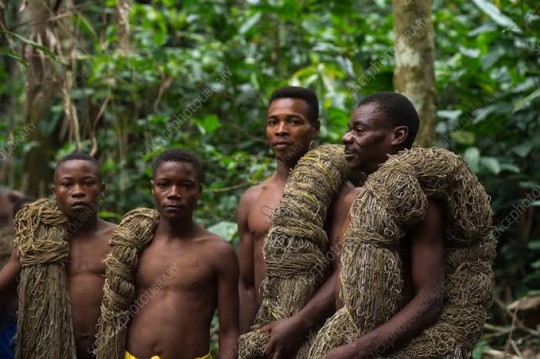
8. **Hunting with Falcons and Other Birds of Prey:** In some North African and Middle Eastern regions, including parts of Morocco, hunting with trained falcons and other birds of prey is a long-standing tradition, though not exclusive to Africa.
9. **Cultural and Spiritual Practices:** For many African tribes, hunting is not just about acquiring food but is deeply intertwined with cultural and spiritual beliefs. Rituals and ceremonies often accompany hunting expeditions to seek blessings or guidance from ancestors or spirits.
It's important to note that as African societies have modernized, some traditional hunting practices have given way to more contemporary methods and conservation efforts. Many African countries have implemented wildlife protection laws and sustainable hunting practices to ensure the survival of their native fauna and the preservation of their cultural heritage.

#life#animals#culture#aesthetic#black history#history#blm blacklivesmatter#anime and manga#architecture#black community#hunting
47 notes
·
View notes
Text
0 notes
Text

Diverse African Cultures and Beliefs about Life After Death
Introduction
Africa is a continent rich in cultural diversity and traditions, and this extends to its beliefs about life after death. Across the vast expanse of Africa, there are numerous cultures, each with its own unique perspective on what happens when life on Earth comes to an end. In this article, we will explore some of the fascinating beliefs about life after death that are deeply ingrained in African societies.
1. The Ancestor Veneration of the Akan People (Ghana and Ivory Coast)
In Akan culture, which encompasses the Ashanti, Fante, and Akuapem people, ancestors hold a significant place in the spiritual realm. They believe that after death, the souls of the departed continue to exist and influence the lives of their living descendants. Ancestor veneration involves rituals, offerings, and prayers to keep these spirits content and receive guidance and protection from them.
2. The Reincarnation Belief of the Yoruba People (Nigeria, Benin, and Togo)
The Yoruba people have a belief in reincarnation, where it is thought that the soul of a deceased person is reborn into a new body. The deceased's name may even be given to the newborn as a way of connecting the past and present lives. The Yoruba also believe that the deceased can communicate with the living in dreams and visions.
3. The Eternal Journey in Ancient Egyptian Culture (Egypt)
Ancient Egypt is renowned for its elaborate beliefs about the afterlife. Egyptians believed in a complex journey after death, where the soul faced trials and judgment before reaching the eternal paradise known as the "Field of Reeds." To ensure a successful afterlife, elaborate burial rituals and tombs were constructed, including the famous pyramids.
4. The Importance of Ancestral Connection in Zulu Beliefs (South Africa)
Among the Zulu people, the connection to ancestors is deeply cherished. It is believed that after death, the ancestors continue to play a role in the lives of their descendants. Rituals such as sacrifices and ceremonies are performed to honor and seek guidance from these ancestral spirits. Displeasing the ancestors can bring misfortune, while pleasing them can bring blessings.
5. The Dualistic Beliefs of the Dogon People (Mali)
The Dogon people have a dualistic belief system. They believe that after death, one's soul splits into two parts: one part goes to the ancestral realm, while the other is reincarnated into a new being. This complex system reflects the Dogon's spiritual connection to both their ancestors and the cycle of life.
6. The Spiritual Transition in the Akan-Bono Culture (Ghana)
The Akan-Bono people have a unique belief in the transitional phase after death. It is believed that after a person dies, their soul goes through a period of adjustment before joining the ancestors in the spiritual realm. During this time, the soul is thought to revisit important places and people from their earthly life.:
7. The Burial Rituals of the Senufo People (Ivory Coast, Mali, and Burkina Faso)
Among the Senufo people, the transition from life to the afterlife is marked by elaborate burial rituals. They believe that after death, the deceased's spirit lingers in the vicinity of their burial site. Special ceremonies and sacrifices are conducted to ensure a peaceful journey for the departed and to maintain a connection between the living and the deceased.
8. The Concept of the "Underworld" in San/Bushmen Beliefs (Southern Africa)
The San people, also known as Bushmen, have a belief in an underworld inhabited by spirits. After death, the souls of the departed are thought to travel to this underworld, which is considered a realm of ancestral spirits. The San people often use trance dance rituals to communicate with these spirits and seek guidance.
9. The Immortality Belief of the Himba People (Namibia)
The Himba people hold a belief that the spirits of their ancestors are immortal and continue to watch over the living. They also believe in reincarnation, where the spirit of a deceased person can be reborn into a new child within the same family. This belief reinforces the strong bond between generations.
10. The Role of Dreams in Khoikhoi Beliefs (South Africa)
The Khoikhoi people place great importance on dreams as a means of communication with the deceased. It is believed that dreams can provide insights, warnings, or messages from the spirit world. Special rituals are performed to interpret dreams and receive guidance from ancestors.
11. The Journey to the "Land of the Dead" in Dinka Culture (South Sudan)
Among the Dinka people, the journey to the afterlife is seen as a migration to the "Land of the Dead." They believe that the deceased will join their ancestors in this realm, where they can continue their pastoral lifestyle. Special rites and ceremonies are conducted to facilitate this transition.
12. The Symbolism of the Baobab Tree in Many African Beliefs
Across various African cultures, the mighty baobab tree is often associated with the afterlife. It is believed that these ancient trees serve as a link between the earthly realm and the world of spirits. Many cultures bury their deceased near baobab trees, believing that the tree's roots connect with the spirits below.
Conclusion
The intricate beliefs about life after death in Africa reflect the continent's cultural richness and diversity. From ancestor veneration to reincarnation, from underworld journeys to dream communication, these beliefs offer a glimpse into the deep spiritual connections that African societies maintain with their departed loved ones. Each culture's unique perspective contributes to the fascinating mosaic of African spirituality and traditions.
#life#animals#culture#aesthetic#black history#history#blm blacklivesmatter#anime and manga#architecture#black community
197 notes
·
View notes
Text
AFRICAN VOODOO
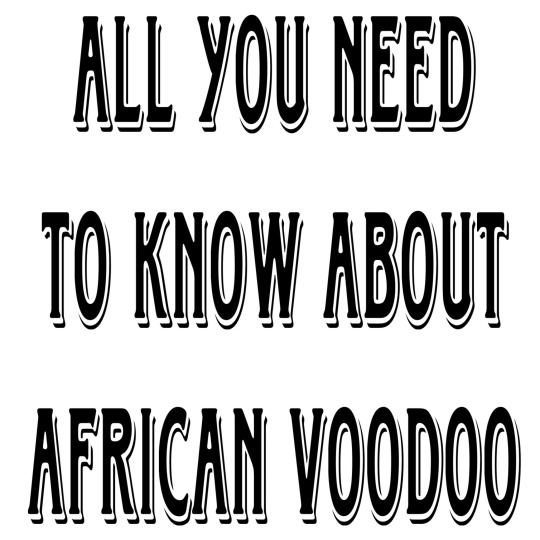
The deep truth about AFRICAN VOODOO
African Voodoo: Unraveling the Mysteries of a Rich Spiritual Tradition
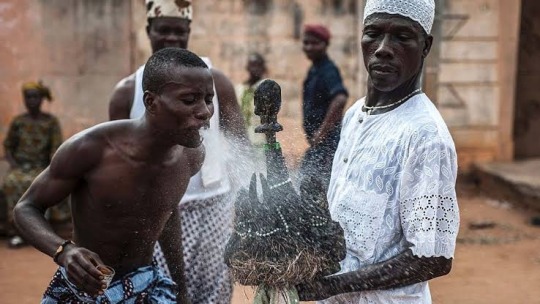
African Voodoo, often shrouded in mystery and misconceptions, is a complex and fascinating spiritual tradition with deep-rooted cultural significance. This ancient belief system, practiced in various forms across the African continent and the African diaspora, offers a unique perspective on the relationship between humans, nature, and the divine. In this article, we will delve into the world of African Voodoo, exploring its history, beliefs, rituals, and its enduring impact on the cultures and societies where it thrives.
A Diverse Tradition
Voodoo, also spelled Vodou or Vodun, is not a monolithic belief system; rather, it is a diverse and adaptable spiritual tradition that has evolved differently in various regions of Africa and beyond. Its origins can be traced back to the indigenous religions of West and Central Africa, where it was practiced by different ethnic groups. Over time, African Voodoo underwent syncretism with Catholicism and indigenous beliefs in the Caribbean, particularly in Haiti, giving birth to Haitian Vodou, which is perhaps the most well-known form of Voodoo.
Core Beliefs
At its core, African Voodoo centers around the veneration of spirits, ancestors, and deities. These spirits are believed to have the power to influence human life and the natural world. Each spirit has a specific domain, and practitioners seek their guidance and assistance through various rituals and offerings. Ancestor worship is a fundamental aspect of Voodoo, as it connects the living to their familial lineage and heritage.
The Loa, or spirits, are a central focus of Voodoo ceremonies. These spirits are intermediaries between humans and the ultimate divine force. Practitioners often enter trance-like states to communicate with the Loa, who possess them temporarily during rituals. The Loa are known for their distinct personalities and preferences, and offerings such as food, drinks, and dance are made to appease and honor them.
Rituals and Practices
Voodoo rituals are colorful and lively events filled with drumming, dancing, singing, and the use of symbolic objects. Rituals are often held in temples or outdoor spaces, and they vary widely depending on the specific tradition and purpose. Some rituals are celebratory, while others are intended to seek protection, healing, or guidance.
One of the most famous Voodoo rituals is the "Voodoo Doll," which is often misunderstood. These dolls are not meant for causing harm but are used as tools for healing or connecting with a specific person's spirit. Pins may be used symbolically to focus intention.
Voodoo in the African Diaspora
The transatlantic slave trade played a significant role in spreading African Voodoo to the Americas, particularly in regions like Haiti, New Orleans, and Brazil. In these places, Voodoo underwent further syncretism with local beliefs and Catholicism, resulting in unique variations of the tradition.
Haitian Vodou, for instance, is a vibrant blend of African Voodoo, Catholicism, and indigenous Taino beliefs. It has had a profound impact on Haitian culture and played a central role in the struggle for independence from colonial rule.
Misconceptions and Stereotypes
African Voodoo has been the subject of many misconceptions and stereotypes, often portrayed negatively in popular culture. These portrayals frequently focus on the more sensational aspects of Voodoo, such as curses and zombies, rather than its rich cultural and spiritual dimensions. It's important to recognize that Voodoo is a legitimate religious practice for millions of people, and like any belief system, it encompasses a wide range of beliefs and practices.
African Voodoo is a complex, multifaceted spiritual tradition with a deep and enduring cultural significance. It is a testament to the resilience of African heritage and the ability of beliefs to adapt and evolve over time. Beyond the stereotypes and misconceptions, Voodoo represents a profound connection between humans, nature, and the divine—a connection that continues to shape the lives and cultures of those who practice it.
Communication with the spirits, often referred to as Loa or Lwa in Voodoo, is a central aspect of Voodoo rituals and practices. Here's an overview of how practitioners communicate with these entities:

1. **Rituals and Offerings**: Voodoo rituals are the primary means of communication with the spirits. Practitioners gather in a designated sacred space, such as a temple or outdoor altar. They often create an elaborate ritual environment with symbols, candles, and ceremonial objects. Offerings, including food, drinks, tobacco, and other items, are presented to specific spirits to gain their favor and attention.
2. **Dance and Music**: Music and dance are essential elements of Voodoo ceremonies. Drumming and chanting create a rhythmic and trance-inducing atmosphere. Through dance and music, practitioners enter altered states of consciousness, allowing them to connect with the spirits more profoundly. It is believed that the spirits may possess individuals during these ceremonies, providing a direct channel for communication.
3. **Possession and Trance**: One of the most distinctive aspects of Voodoo rituals is the concept of spirit possession. Practitioners, often referred to as "servants of the spirits," may enter a trance-like state during which a particular Loa or spirit is believed to take control of their body. In this state, the possessed individual may speak in the voice of the spirit, offering guidance, advice, or requests on behalf of the spirit.
4. **Divination**: Divination is another way to communicate with the spirits in Voodoo. Practitioners may use various divination tools such as tarot cards, cowrie shells, or casting of objects to seek guidance from the spirits. These divination practices help practitioners understand the desires and intentions of the spirits and may provide insights into their own lives.
5. **Prayer and Invocation**: Voodoo practitioners often use prayer and invocation to establish a connection with the spirits. Specific prayers or invocations are recited to call upon a particular spirit's presence and assistance. These prayers are typically passed down through generations and may be spoken in a specific language or dialect.
6. **Voodoo Dolls**: Contrary to popular misconceptions, Voodoo dolls are not used for causing harm but are symbolic tools for communication. They can represent a specific person or spirit and are employed in rituals to convey intentions, requests, or healing energy to the spirits associated with them.
It's important to note that communication with the spirits in Voodoo is a deeply spiritual and cultural practice, and the methods may vary among different Voodoo traditions and communities. Voodoo practitioners believe that these rituals and practices maintain a reciprocal relationship with the spirits, offering offerings and devotion in exchange for protection, guidance, and assistance in various aspects of life.
Masquerades and Voodoo in Africa: A Cultural Tapestry of Spiritual Expression
Africa is a continent rich in cultural diversity, and its spiritual practices are as varied as its landscapes. Among the many vibrant traditions that permeate African culture, masquerades and Voodoo (often spelled Vodun or Vodou) hold significant places in the hearts and lives of its people. This article explores the fascinating intersection of masquerades and Voodoo, shedding light on how these practices are intertwined with African spirituality.
**Masquerades: The Embodiment of Spirits**
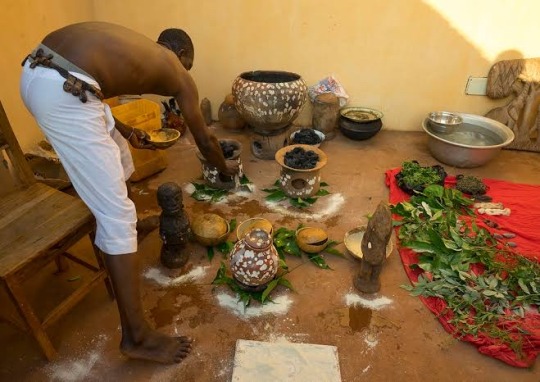
Masquerades are a prominent cultural phenomenon across Africa, characterized by elaborate costumes, masks, and dances. These performances serve multifaceted purposes, including entertainment, social commentary, and spiritual expression. However, it's the latter aspect, the spiritual dimension, that ties masquerades to Voodoo and other indigenous African belief systems.
1. **Role of Ancestors**: In many African cultures, masquerades are a means of connecting with ancestors and spirits of the deceased. The masks and costumes worn by performers often represent these spirits. During masquerade ceremonies, participants believe that the spirits inhabit the masks and interact with the living. This interaction serves as a way to honor and seek guidance from the ancestors.
2. **Protection and Cleansing**: Some masquerades have protective roles in communities. They are believed to ward off evil spirits, illnesses, or other malevolent forces. These masquerades often perform purification rituals, symbolically cleansing the community and its members.
3. **Harvest and Fertility Celebrations**: Masquerades are frequently associated with agricultural and fertility rites. They may perform dances and rituals to ensure a bountiful harvest or to promote fertility among the community members.
4. **Social Order and Governance**: Masquerades also play a role in enforcing social norms and maintaining order within communities. They may act as judges, mediators, or enforcers of communal rules during their performances.
**Voodoo: The Spiritual Heartbeat**
Voodoo, a widely practiced religion across West Africa and its diaspora, is deeply entwined with masquerades and the spiritual fabric of the continent.
1. **Ancestor Worship**: Voodoo places a significant emphasis on ancestor worship, much like masquerades. Practitioners believe that the spirits of ancestors are ever-present and can influence the living. Offerings, rituals, and masquerade performances are ways to honor and seek the guidance of these spirits.
2. **Connection to Nature**: Voodoo, like many African belief systems, recognizes the close relationship between humans and nature. It views natural elements, such as rivers, forests, and animals, as inhabited by spirits. Masquerades often incorporate nature-centric symbolism in their performances.
3. **Trance and Possession**: Both Voodoo and certain masquerades involve altered states of consciousness. In Voodoo, devotees may enter trances and become possessed by spirits, similar to the possession experiences during some masquerade ceremonies. These states facilitate direct communication with the divine.
4. **Rituals and Sacrifices**: Offerings and sacrifices are common in both Voodoo and masquerade traditions. These rituals are believed to appease spirits and seek their favor.
**Cultural Resilience and Transformation**
While masquerades and Voodoo have endured the test of time and colonization, they have also adapted and evolved. In the African diaspora, especially in the Americas, they fused with other cultural elements and religions, giving rise to unique traditions such as Haitian Vodou and New Orleans Voodoo.
masquerades and Voodoo in Africa are vibrant expressions of spirituality, culture, and identity. They are living traditions that continue to shape the lives and beliefs of countless individuals and communities, offering insights into the enduring resilience and adaptability of African cultures in the face of change and adversity.
The timing for Voodoo practices, like many spiritual traditions, can vary depending on the specific tradition, the purpose of the practice, and the preferences of the practitioner. There is no universally "best" time for Voodoo practice, but certain times and occasions are commonly observed:
1. **Festival Days**: Many Voodoo traditions have specific festival days or holidays when practitioners gather to perform rituals and ceremonies. For example, in Haitian Vodou, the Festival of the Ancestors (Fèt Gede) is a significant event where people honor and communicate with their ancestors. These festivals often have fixed dates in the Voodoo calendar.
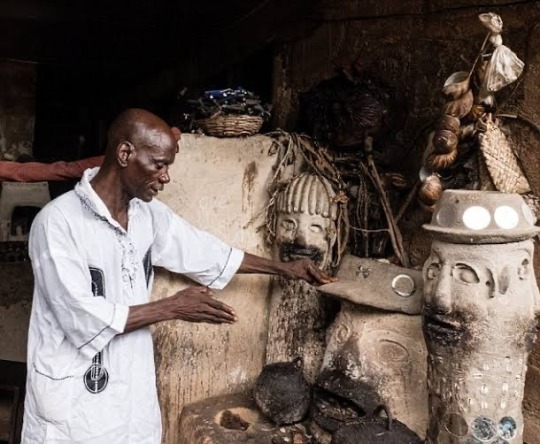
2. **Full Moon and New Moon**: Lunar phases are significant in various spiritual practices, including Voodoo. Some practitioners prefer to conduct rituals during the full moon or new moon, believing that these phases are particularly potent for spiritual work. The full moon is often associated with amplifying energy and intentions, while the new moon is seen as a time for new beginnings.
3. **Nighttime**: Many Voodoo rituals take place during the nighttime. This is believed to be a time when the veil between the spiritual and physical realms is thinner, making it easier to communicate with the spirits. Candlelit ceremonies, drumming, and dancing are common elements of Voodoo rituals conducted at night.
4. **Personal Preference**: Individual practitioners may have their own preferred times for Voodoo practice based on their personal experiences and beliefs. Some may feel a stronger connection to the spirits during specific times of the day or year.
5. **Life Events**: Voodoo is often integrated into various life events such as births, marriages, and funerals. The timing of these rituals is determined by the occurrence of these events.
6. **Consulting a Voodoo Priest/Priestess**: For more specific guidance on the timing of Voodoo practices, consulting a Voodoo priest or priestess is advisable. They can provide insights based on their knowledge and experience within their particular Voodoo tradition.
It's essential to remember that Voodoo is not a monolithic practice; it encompasses various traditions and regional variations, each with its own customs and beliefs. Therefore, the best time for Voodoo practice can differ significantly from one tradition to another. Additionally, Voodoo is deeply rooted in cultural and spiritual contexts, so practitioners often follow the customs passed down through generations within their specific communities.
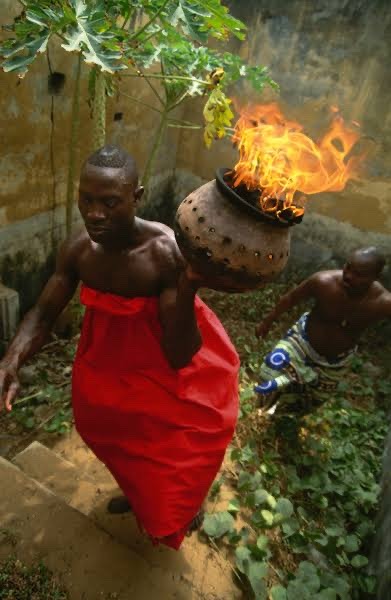
#life#animals#culture#aesthetic#black history#history#blm blacklivesmatter#anime and manga#architecture#black community#heritagesites#culturaltours
259 notes
·
View notes
Text
AN ARTICLE ON THE BRITISH LOOTING FROM AFRICA
AND SUFFERING OF AFRICANS
The British should return every loot of all kinds back to Africa
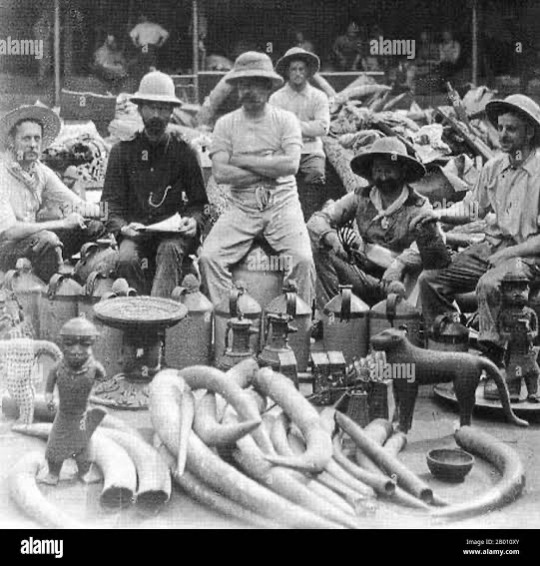

IF THEY CONDEMN SLAVE TRADE THEY SHOULD START BY RETURNING THE LOOTS COLLECTED FROM AFRICA ALL IN THE NAME OF TRADE AND RELIGION ,IF OUR CULTURE WAS BAD WHY DID THEY TAKE AWAY OUR HERITAGE AND STORE THEM IN A MUSEUM ?
The looting of Africa during the colonial era occurred through a combination of methods and strategies employed by European colonial powers, including Britain. Here are some of the ways in which Africa was looted during this period:
Military Conquest: European colonial powers, including the British, often used military force to conquer and control African territories. This involved armed conflicts, wars of conquest, and the suppression of local resistance movements. Through these military campaigns, colonial powers gained control over land and resources.
Resource Extraction: One of the primary motivations for colonialism in Africa was the exploitation of its abundant natural resources. European colonial powers, including Britain, extracted valuable resources such as minerals, rubber, timber, and agricultural products from African colonies. These resources were often taken for the economic benefit of the colonial powers.
Forced Labor: Colonial powers imposed forced labor systems on Africans to work in mines, plantations, and other labor-intensive industries. These labor practices were exploitative and often involved harsh working conditions and little compensation.
Taxation and Economic Exploitation: Africans were subjected to unfair taxation systems that drained wealth from their communities. Colonial administrations imposed taxes on land, crops, and other economic activities, forcing Africans to generate revenue for the colonial authorities.
Land Dispossession: Africans frequently lost access to their ancestral lands as colonial governments allocated land to European settlers and corporations. This land dispossession disrupted traditional agricultural practices and led to social and economic dislocation.
Confiscation of Cultural Artifacts: Colonial powers often confiscated cultural artifacts, sculptures, art, and religious items from Africa. These items were frequently transported to Europe and ended up in museums, private collections, or auction houses.
Unequal Trade Agreements: Colonial powers imposed trade agreements that favored their own economies. Africans often received minimal compensation for their raw materials and agricultural products, while European countries reaped significant profits from these trade relationships.
Suppression of Indigenous Cultures: The suppression of indigenous African cultures and languages was another aspect of colonialism. European powers sought to impose their own cultural norms and values, often devaluing or erasing African traditions.
Missionaries played a complex role in the context of colonialism and the looting of Africa. While their primary mission was to spread Christianity and convert indigenous populations to Christianity, their activities and interactions with colonial authorities had various effects on the looting of Africa:
1. Cultural Influence: Missionaries often sought to replace indigenous African religions with Christianity. In doing so, they promoted European cultural norms, values, and practices, which contributed to cultural change and, in some cases, the erosion of traditional African cultures.
2. Collaboration with Colonial Powers: In some instances, missionaries worked closely with colonial authorities. They provided moral and religious justification for colonialism and sometimes acted as intermediaries between the colonial administration and local communities. This collaboration could indirectly support the colonial exploitation of resources.
3. Access to Resources: Missionary activities occasionally granted them access to valuable resources and artifacts. They may have collected religious objects, manuscripts, and other items from indigenous communities, which were sometimes sent back to Europe as part of ethnographic or religious collections.
4. Education and Healthcare: Missionaries established schools, hospitals, and other institutions in African communities. While these services were aimed at spreading Christianity, they also provided education and healthcare to local populations, which could have positive impacts on individuals and communities.
5. Advocacy for Indigenous Rights: Some missionaries, particularly in later years, became advocates for the rights of indigenous populations. They witnessed the injustices of colonialism and spoke out against the mistreatment of Africans, including forced labor and land dispossession.
6. Conversion and Social Change: The conversion of Africans to Christianity brought about significant social changes in some communities. It could lead to shifts in social hierarchies, family structures, and gender roles, sometimes contributing to social upheaval.
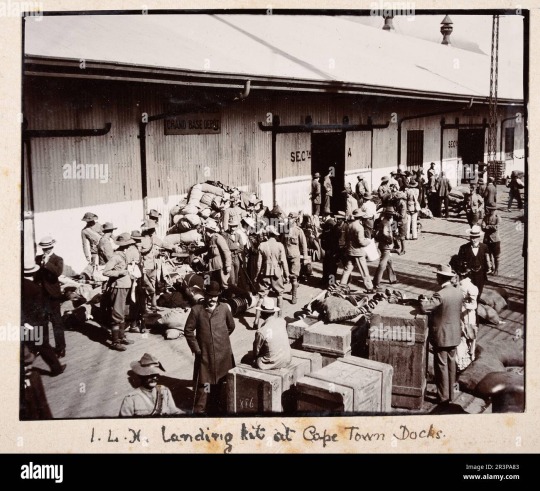

1. Cultural Bias: The British, like many Europeans of their time, often viewed their own culture, including Christianity, as superior to the indigenous cultures and religions they encountered in Africa. This cultural bias led to the condemnation of indigenous African religions and gods as "pagan" or "heathen."
2. Religious Conversion: Part of the colonial mission was to spread Christianity among the indigenous populations. Missionaries were sent to Africa with the aim of converting people to Christianity, which often involved suppressing or condemning traditional African religions and deities seen as incompatible with Christianity.
3. Economic Interests: The British Empire, like other colonial powers, was driven by economic interests. They often saw the resources and wealth of African societies as valuable commodities to be exploited. This economic agenda could involve looting or confiscating sacred artifacts, including religious objects, for financial gain.
4. Ethnographic Research: Some British colonial officials and scholars engaged in ethnographic research to study African cultures, including their religious practices. While this research aimed to document indigenous cultures, it could sometimes involve the collection of religious artifacts and objects, which were then sent to museums or private collections in Europe.
5. Cultural Imperialism: Colonialism was not just about economic and political domination; it also involved cultural imperialism. This included an attempt to impose European cultural norms, values, and religious beliefs on African societies, often at the expense of indigenous traditions.
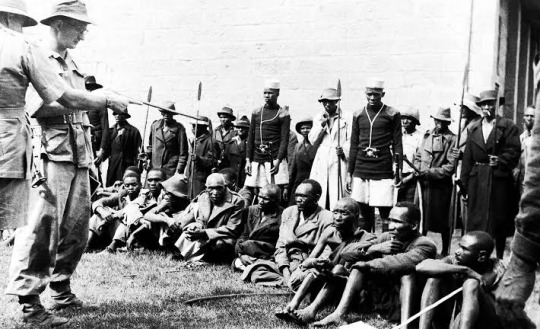
The issue of repatriating cultural artifacts looted from Africa during the colonial era has gained significant attention in recent years. Countries and communities in Africa have long called for the return of these treasures, which hold deep cultural and historical significance. Among the former colonial powers, Britain stands at the forefront of this debate. This article explores the ongoing discussion surrounding Britain's role in returning looted artifacts to Africa.
A Legacy of Colonialism:
Britain's colonial history left a profound impact on many African nations, including the removal of countless cultural treasures. During the height of the British Empire, valuable artifacts, sculptures, manuscripts, and sacred items were taken from their places of origin. These items found their way into the collections of museums, private collectors, and institutions in Britain.
The Case for Repatriation:
Advocates for repatriation argue that these artifacts rightfully belong to the countries and communities from which they were taken. They emphasize the importance of returning stolen cultural heritage as a step towards justice and reconciliation. Many African nations view these artifacts as integral to their cultural identity and heritage.
International Momentum:
In recent years, there has been a growing international momentum to address this issue. Museums and institutions worldwide are engaging in discussions about repatriation. Some institutions have initiated efforts to return specific items to their countries of origin, acknowledging their historical and moral responsibility.
Britain's Response:
Britain, home to several renowned museums housing African artifacts, has faced increasing pressure to address this issue. The British Museum, for instance, has faced calls to repatriate numerous artifacts, including the Benin Bronzes and the Elgin Marbles, which have origins in Africa and Greece, respectively.
In response to these demands, some British institutions have started to collaborate with African countries to explore the possibility of returning certain artifacts. These discussions aim to find mutually agreeable solutions that respect both the historical context and the cultural significance of these items.
Challenges and Complexities:
Repatriation is a complex process involving legal, ethical, and logistical challenges. Determining rightful ownership and ensuring proper care and preservation upon return are critical considerations. Additionally, questions arise about how to address the legacy of colonialism and rectify historical injustices.
The Way Forward:
The debate over repatriation is ongoing and highlights the need for respectful dialogue and cooperation between nations. While the return of looted artifacts is an essential step, it should also be part of broader efforts to promote cultural understanding, collaboration, and acknowledgment of historical wrongs.
The issue of Britain returning looted artifacts to Africa is part of a global conversation about justice, cultural heritage, and historical responsibility. While there are complexities to navigate, the growing recognition of the importance of repatriation signifies a potential path forward towards reconciliation and healing between nations and their shared history. The ongoing discussions reflect a commitment to addressing past injustices and fostering a more inclusive and culturally rich future.
They condemn slave trades yet they’re still with our treasures and cultural artifacts and heritage
#life#animals#culture#aesthetic#black history#blm blacklivesmatter#anime and manga#architecture#black community#history#blacklivesmatter#black heritage#heritage
211 notes
·
View notes
Text
Title: "The Significance and Diversity of African Names"
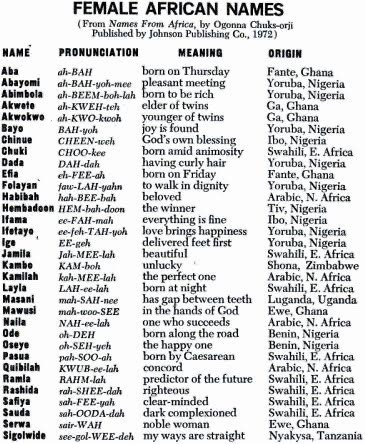
Introduction
African names are a reflection of the continent's incredible diversity, culture, history, and traditions. With over 2,000 distinct languages spoken and a multitude of ethnic groups, Africa is a treasure trove of names that carry deep meanings and unique stories. In this article, we'll explore the rich tapestry of African names, their significance, and the cultural diversity they represent.
The Importance of Names
Names hold a special place in African societies. They are more than mere labels; they encapsulate a person's identity, heritage, and often convey messages of hope, aspiration, and blessings. African names are deeply rooted in the belief that a name can shape a person's destiny and character.
Linguistic Diversity
Africa's linguistic diversity is astounding, with thousands of languages spoken across the continent. Each language group has its distinct naming traditions, resulting in a vast array of names. For example, in West Africa, Akan names such as "Kwame" (born on a Saturday) and "Kofi" (born on a Friday) are common, while in East Africa, Swahili names like "Amina" (trustworthy) and "Nia" (purpose) are prevalent.
Meanings and Symbolism
African names are rich in meaning and symbolism, often reflecting the circumstances of a child's birth, their family history, or the aspirations of their parents. Names can signify virtues like courage, strength, and wisdom or convey hopes for a prosperous and fulfilling life.
Family and Heritage
In many African cultures, names are chosen to honor ancestors, celebrate cultural heritage, or connect the child to their roots. This practice ensures that generations remain connected to their family's history and traditions. For example, the Igbo people of Nigeria often use "Ngozi" (blessing) to convey the hope for a blessed life..
Naming Ceremonies
Naming ceremonies are significant events in many African communities. These ceremonies are joyous occasions where family and friends gather to celebrate the birth of a child and bestow a name. The rituals and customs associated with these ceremonies vary widely, showcasing the diversity of African naming traditions.
Modern Influences
In today's globalized world, African names are not confined to the continent. Many people of African descent living outside Africa proudly bear African names, celebrating their cultural heritage and contributing to the global recognition of the beauty and significance of these names.
Conclusion
African names are a testament to the continent's diversity, culture, and history. They carry profound meanings, connect individuals to their heritage, and celebrate virtues and aspirations. As we embrace and appreciate the beauty of African names, we also acknowledge the importance of preserving and passing on these cultural treasures to future generations, ensuring that the rich tapestry of African identity remains vibrant and thriving.
1. **Kwame (Akan, Ghana):** A male name meaning "born on a Saturday."
2. **Ngozi (Igbo, Nigeria):** A unisex name meaning "blessing" or "good fortune."
3. **Lulendo (Lingala, Congo):** A male name meaning "patient" or "tolerant."
4. **Amina (Swahili, East Africa):** A female name meaning "trustworthy" or "faithful."
5. **Kwesi (Akan, Ghana):** A male name meaning "born on a Sunday."
6. **Nia (Swahili, East Africa):** A unisex name meaning "purpose" or "intention."
7. **Chinwe (Igbo, Nigeria):** A female name meaning "God owns" or "God's own."
8. **Mandla (Zulu, South Africa):** A male name meaning "strength" or "power."
9. **Fatoumata (Wolof, Senegal):** A female name meaning "the great woman."
10. **Kofi (Akan, Ghana):** A male name meaning "born on a Friday."
These are just a few examples, and there are countless other African names with unique meanings and significance. It's essential to remember that Africa is incredibly diverse, and each region and ethnic group has its own naming traditions and languages, contributing to the rich tapestry of African names.
The most popular African names among Black Americans can vary widely based on individual preferences, family traditions, and regional influences. Many Black Americans choose names that connect them to their African heritage and celebrate their cultural roots. Here are a few African names that have been embraced by some Black Americans:
1. **Malik:** This name has Arabic and African origins and means "king" or "ruler."
2. **Amina:** A name of Swahili origin, meaning "trustworthy" or "faithful."
3. **Kwame:** Derived from Akan culture, it means "born on a Saturday."
4. **Nia:** A Swahili name representing "purpose" or "intention."
5. **Imani:** Of Swahili origin, it means "faith" or "belief."
6. **Jamal:** This name has Arabic and African roots and means "handsome."
7. **Ade:** A Yoruba name meaning "crown" or "royalty."
8. **Zuri:** Of Swahili origin, it means "beautiful."
9. **Sekou:** Derived from West African languages, it means "fighter" or "warrior."
10. **Nala:** This name is of African origin and means "gift."
It's important to note that while these names have African origins, their popularity among Black Americans can vary by region and individual choice. Additionally, some Black Americans choose to create unique or hybrid names that blend African and American influences, reflecting their personal and cultural identities. The naming choices among Black Americans are diverse and reflect the rich tapestry of their heritage and experiences.
African Languages: A Tapestry of Diversity and Culture"
Introduction
Africa is a continent known for its stunning natural landscapes, diverse wildlife, and rich cultural heritage. Among its many treasures, the continent boasts an astonishing linguistic diversity that is often overlooked. In this article, we delve into the fascinating world of African languages, exploring their diversity, cultural significance, and the challenges they face in a rapidly changing world.
The Linguistic Kaleidoscope
Africa is home to over 2,000 distinct languages, making it one of the most linguistically diverse regions on the planet. These languages belong to several different language families, including Afroasiatic, Nilo-Saharan, Niger-Congo, and Khoisan, each with its unique characteristics.
Niger-Congo Family: The vast majority of African languages, including Swahili, Yoruba, Zulu, and Kikuyu, belong to the Niger-Congo language family. This family stretches across West, Central, and Southern Africa, reflecting the continent's linguistic richness.
Afroasiatic Languages: Arabic, a member of the Afroasiatic family, has a significant presence in North Africa, while other Afroasiatic languages like Amharic are spoken in the Horn of Africa.
Nilo-Saharan Languages: Found in parts of East and North Central Africa, Nilo-Saharan languages include Dinka, Kanuri, and Nubian.
Khoisan Languages: These languages, characterized by their unique click consonants, are primarily spoken by indigenous groups in Southern Africa, such as the San and Khoi people.
Cultural Significance
African languages are not just tools of communication; they are repositories of cultural heritage and identity. They carry the history, stories, and traditions of their speakers. Each language is a key to unlocking the rich tapestry of African cultures, from oral storytelling and folklore to religious rituals and traditional medicine
Preserving Cultural Diversity
Despite their cultural importance, many African languages are endangered. The rise of global languages like English, French, and Portuguese, often due to colonial legacies, has led to the decline of indigenous languages. To address this, efforts are being made to document, preserve, and revitalize endangered African languages through education, community initiatives, and technology.
A Language of Unity
In some regions, African languages are a means of fostering unity. For example, Swahili, a Bantu language with Arabic influences, serves as a lingua franca in East Africa, promoting communication and cooperation among diverse ethnic groups.
Challenges and Opportunities
While African languages face challenges in an increasingly interconnected world, they also offer unique opportunities. Embracing linguistic diversity can strengthen cultural identities, promote inclusive education, and drive economic growth through multilingualism.
Conclusion
African languages are an integral part of the continent's rich heritage and cultural tapestry. They represent the diversity of Africa's peoples and their traditions. While challenges exist, there is hope that efforts to preserve and celebrate these languages will ensure that they continue to thrive, enriching the world with their unique beauty and significance. In an increasingly globalized world, Africa's linguistic diversity is a testament to the resilience and vibrancy of its cultures.
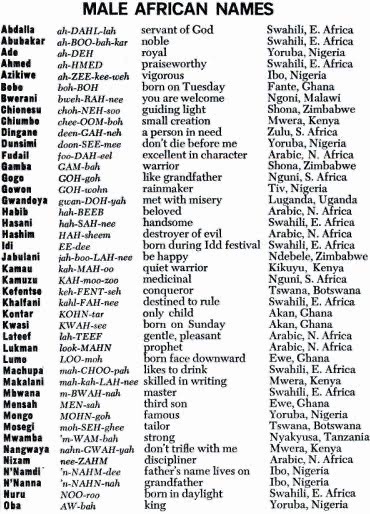
#life#animals#culture#aesthetic#black history#history#blm blacklivesmatter#anime and manga#architecture#black community#language
709 notes
·
View notes
Text

BoHo Goth decor. I haven't heard of this style.
Home Decor Trends
193 notes
·
View notes
Text
ALL YOU NEED TO KNOW ABOUT THE HEAD OF OBA
THE BENIN KINGDOM
THE LOOTED TREASURES BY THE BRITISH EMPIRE
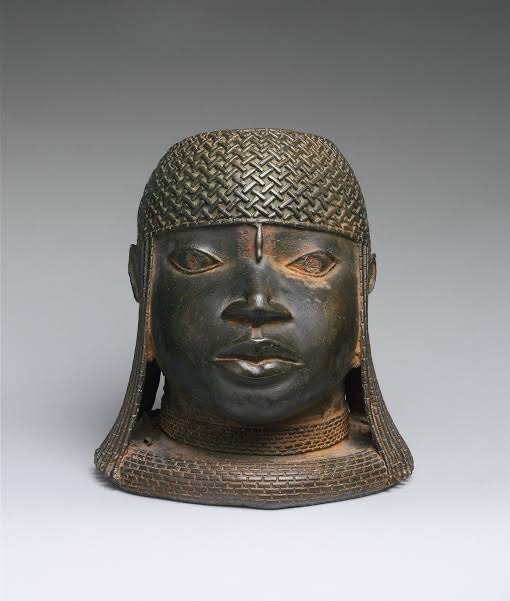
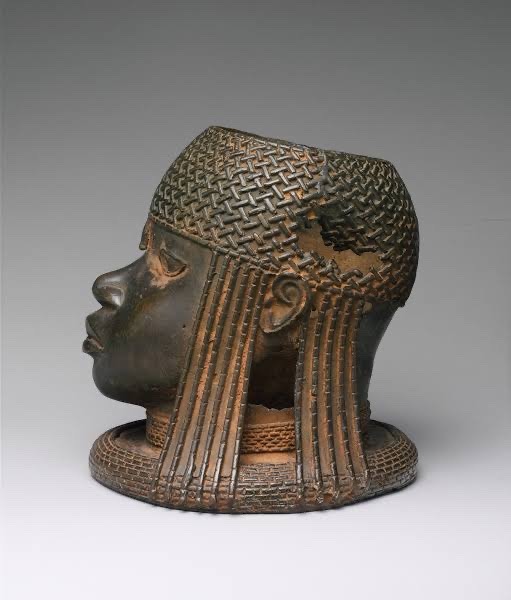
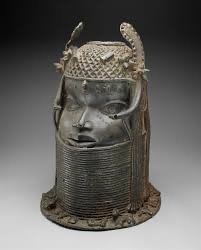
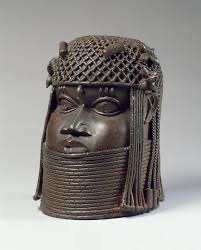
BLACK HISTORY IS DEEPER THAN SLAVE TRADE
The head sculptures of the Oba of Benin, also known as the Benin Bronzes, are a collection of intricate bronze and brass sculptures created by the Edo people of Nigeria. These sculptures typically depict the reigning Oba (king) of the Benin Empire and were produced over several centuries, with some dating back to the 13th century.
They are renowned for their artistic and historical significance, representing the cultural heritage and power of the Benin Kingdom. These sculptures often portray the Oba wearing coral beaded regalia, symbolizing his divine status and authority.
Many of these artifacts were taken from Benin during the late 19th century by British colonial forces, and they are now scattered in museums and private collections worldwide. There have been ongoing discussions and negotiations regarding their repatriation to Nigeria to restore their cultural heritage.
The head sculptures of the Oba of Benin remain a testament to the rich artistic and historical legacy of the Edo people and the Benin Kingdom.
HOW THE BRITISH STOLE FROM THE EDO TRIBE
1. British Punitive Expedition: In 1897, a British expedition, led by British officials and soldiers, was sent to the Benin Kingdom (in what is now Nigeria) with the stated objective of punishing the Oba of Benin, Oba Ovonramwen, for resisting British influence and trade in the region.
2. Sacking of the Royal Palace: During the expedition, the British forces entered the royal palace in Benin City, where many of these intricate bronze and brass sculptures were housed. The palace was looted, and numerous artifacts, including the Benin Bronzes, were taken.
3. Confiscation and Dispersal: The looted artifacts were then confiscated by the British authorities and later distributed to various individuals, museums, and institutions. Many of these artworks ended up in European museums and private collections.
The theft of the Benin Bronzes remains a contentious issue, as these artworks are considered cultural treasures of the Edo people and Nigeria as a whole. There have been ongoing discussions and demands for the repatriation of these artifacts to Nigeria, which has gained momentum in recent years as part of broader efforts to address historical injustices related to colonial-era looting.
The head sculptures of the Oba of Benin, like many traditional African artworks, hold deep symbolic significance within the context of the Benin Kingdom and its culture. Here are some of the key symbols and meanings associated with these sculptures:
1. Royal Authority: The Oba's head sculptures symbolize the authority and divine status of the reigning monarch, who was regarded as a sacred figure in Benin society. The elaborate regalia, such as coral beads and headdresses, worn by the Oba in these sculptures signifies his royal and spiritual power.
2. Ancestral Connections: The sculptures often depict the Oba with distinctive facial scarification patterns and detailed facial features. These features can represent specific ancestors or dynastic connections, emphasizing the Oba's lineage and connection to past rulers.
3. Historical Record: The sculptures also serve as historical records, documenting the appearance and regalia of the Oba during their reigns. This provides valuable insights into the history and evolution of the Benin Kingdom over the centuries.
4. Spiritual Protection: Some sculptures may incorporate elements like beads and cowrie shells, which were believed to have protective and spiritual qualities. These elements were worn by the Oba not only for their aesthetic value but also for their symbolic protection.
5. Cultural Identity: Beyond their specific symbolic meanings, the head sculptures are integral to the cultural identity of the Edo people and the Benin Kingdom. They represent the rich artistic traditions and heritage of the kingdom and its rulers.
It's important to note that the symbolism of these sculptures is deeply rooted in the cultural and historical context of the Benin Kingdom, and their interpretation can vary among different individuals and communities.
#life#animals#culture#aesthetic#black history#history#blm blacklivesmatter#anime and manga#architecture#black community#black heritage
784 notes
·
View notes
Text
AFRICAN PROVERBS AND THEIR MEANINGS
This is a message to my black brothers and sisters
Learn about African proverbs and know your culture is filled with poetry
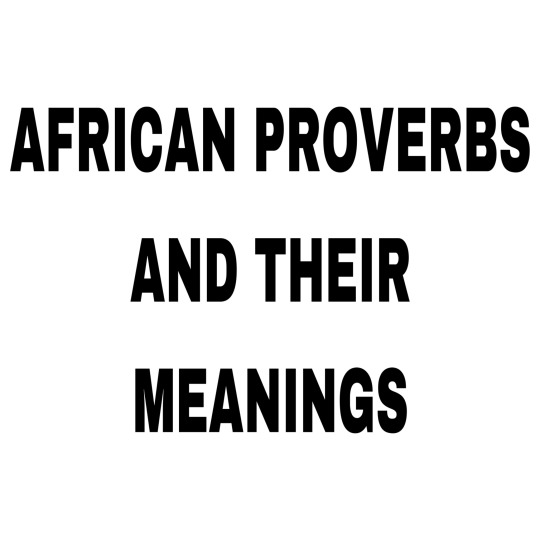
1) Only a fool tests the depth of a river with both feet.
Meaning: You don’t jump straight into a situation without thinking about it first.
2) Knowledge is like a garden: If it is not cultivated, it cannot be harvested.
Meaning: If you don’t make efforts to acquire knowledge then you would not expect to have it and if you do not put the knowledge you have to use, you cannot expect to gain anything from it.
3) Sugarcane is sweetest at its joint.
Meaning: Good and sweet things of life may appear difficult to achieve but in the end, it is worth it.
4) If you offend, ask for a pardon; if offended forgive.
Meaning: This is as simple as it sounds: If you upset someone, apologise to him or her. If someone upsets you, forgive him or her because what goes around, comes around.
5) Don’t set sail using someone else’s star.
Meaning: Avoid copying someone else. Just because someone has been successful in what he/she does should not be what will make you to do the same thing and expect to be successful.
6) The best way to eat an elephant in your path, is to cut him up into little pieces.
Meaning: The best approach to solving a problem is to take it bit by bit; one at a time.
7) A restless feet may walk into a snake pit.
Meaning: If someone is busy doing nothing or is involved in what he does not know about, it is easy for him/her to get into trouble.
8) A chick that will grow into a cock can be spotted the very day it hatches.
Meaning: You can easily foresee the future of something through the character and tell-tale signs it exhibits today.
9) After a foolish deed comes remorse.
Meaning: Feeling sorry always follows a foolish act.
10) A man who pays respect to the great paves the way for his own greatness.
Meaning: What goes around, comes around so whatever you sow, you shall reap.
11) He who does not know one thing knows another.
Meaning: No one knows everything, but everyone knows something.
12) A roaring lion kills no one.
Meaning: You cannot achieve or gain anything by mere sitting around and just talking about it.
13) Do not call the forest that shelters you a jungle.
Meaning: Do not insult someone who is taking care of your responsibility or taking care of you.
14) When a king has good counsellors, his reign is peaceful.
Meaning: What defines a man is the circumstances and people around him and if they are good, he turns out good.
15) It takes a whole village to raise a child.
Meaning: The society is responsible for the moral characters it creates and everyone in a community should be responsible for helping to train a child irrespective of who the parents are; offering correction where they are needed.
16) If a child washes his hands he could eat with kings.
Meaning: If you prepare and allow yourself to be well trained when you have the opportunity, you will achieve a lot and be favoured in due course.
17) The Rain does not fall on one roof.
Meaning: Trouble comes to everyone at one time or another.
18) Life is like a mist or a shadow; it quickly passes by.
Meaning: Life is too short, and you only live it once.
19) Wherever a man goes to dwell, his character goes with him.
Meaning: What defines a man is his character which is, inseparable from him and follows him everywhere he goes.
20) Do not look where you fell, but where you slipped.
Meaning: Don’t look at your mistakes; look at what caused your mistakes, otherwise you may repeat the same mistake again.
He who sees an old hag squatting should leave her alone; who knows how she breathes?
Meaning: You should never interfere in someone's issues, particularly when you do not know anything about them.
Anger against a brother is felt on the flesh, not in the bone. Meaning: You should forget and forgive anything your relatives did to you.
Maize bears fruits once and dies because it is not rooted in the ground. Meaning: You will never get to the top and stay prosperous without a good foundation.
He who will swallow the 'udala' seed must consider the size of his stomach. Meaning: 'Udala' seed is an apple seed. It is never digested in the stomach
#life#animals#culture#aesthetic#black history#history#blm blacklivesmatter#anime and manga#architecture#black community#black heritage#heritage
462 notes
·
View notes
Text
FISHING FESTIVAL IN AFRICA
Argungu Fishing Festival
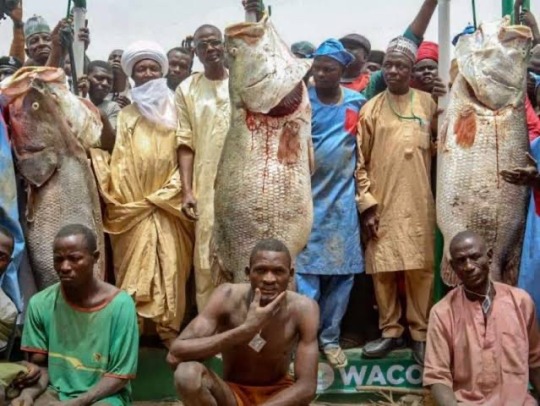
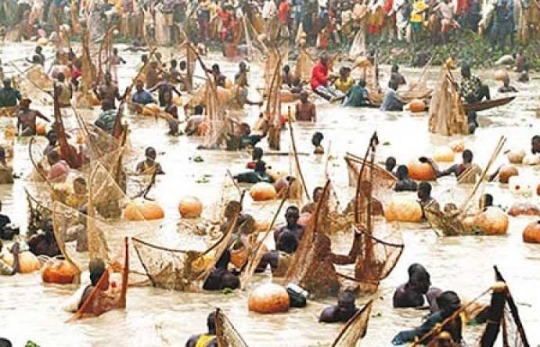
There are lovely cultures and traditions in Africa
Black Americans should read about their heritage
Welcome to Argungu Fishing Festival
Argungu fishing festival is a way of life for the people of Kebbi State. The festival preserves tradition and promotes conservation. The annual festival takes place in February and marks the end of farming season and start of the fishing season. The festival is a four-day cultural event. It begins with an agricultural show, water sport displays, traditional Kebbawa entertainments and ends with the spectacular fishing competition in the Mata Fadan River.
The History
The Argungu fishing festival began in 1934, marking the end of centuries old hostility between Sokoto Caliphate and Kebbi Kingdom. The festival quickly became a celebration of life and unity.

The River Sacrifice
Before the commencement of the fishing festival, the custodian of the river 'Sarkin Ruwa' ensures the river is safe by performing sacrifices to the river oracle to gain its permission.

Sarkin Ruwa
Like his fathers before him, the Sarkin Ruwa is the official custodian of the Mata Fada River. This responsibility is passed down for generation. Without the consent of the Sarkin Ruwa, no fish can be caught. To ensure the river is safe for fishing, he dispels the crocodiles resident in the river and invites all the fishes in the rivers connected to Mata Fada river.

Matan Fada River
The river is a source of pride to the people of Argungu, it serves as a source of food and irrigation for their farm lands. Its about 50 meters wide and about 50 feet deep.
Race To Fish
At the sound of a gun, thousands of fishermen race towards the mata fadan river, leaping into the water to begin their search for the winning freshwater fish
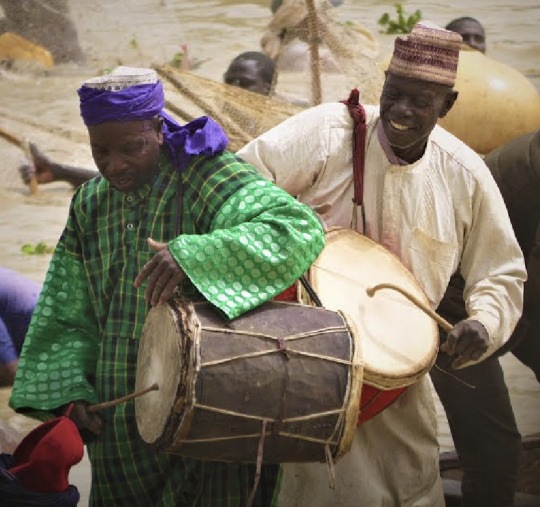
Music and Rhythm
As the fishermen leap into the water, the drummers begin to beat their drums. Filling the air with authentic Kebbawa traditional rhythm. Although women are not allowed to participate in the fishing competition, they are not left out of the drummers group. The drums are traditional Kebbawa drum designs, made of cow skin.
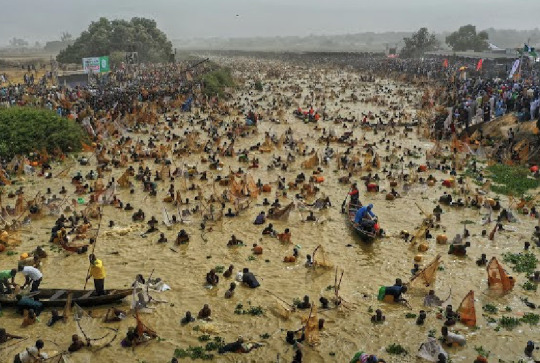
Over 50,000 fishermen from northern Nigeria and surrounding countries participate in the fishing competition annually.
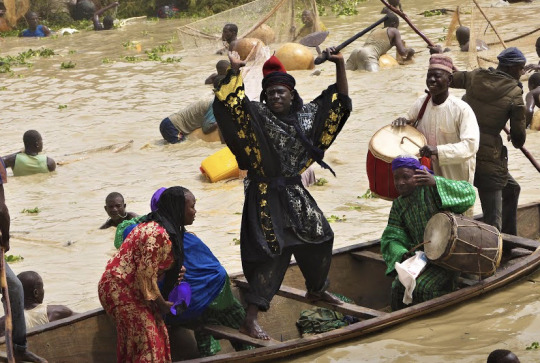
The Sarkin Ruwa and the drummers move to and fro the mata fada river on their canoes, entertaining the fishermen as they search the river for the winning Giwan Ruwa.
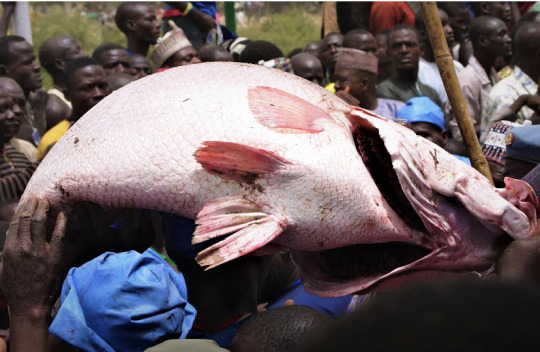
Giwan Ruwa
Giwan Ruwa 'Fish' from the mata fadan river can weigh up to 75 kilograms. The fisherman with the biggest catch wins the fishing competition.
#life#animals#culture#aesthetic#black history#history#blm blacklivesmatter#anime and manga#architecture#black community#traditional illustration#traditional doodle#blacklivesmatter#black heritage
279 notes
·
View notes
Text
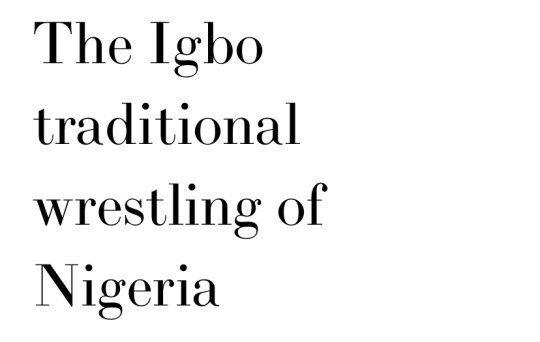
There is video at the end of this article
The Igbo people, also spelled and formerly called Ibo, are an ethnic group in Nigeria. They are mostly found in Abia, Anambra, Ebonyi, Enugu, and Imo States. A sizable Igbo population is also found in Delta and Rivers States. Large ethnic Igbo populations are found in the Republic of Cameroon, Gabon, and Equatorial Guinea, as well as outside Africa. There has been much speculation about the origins of the Igbo people as it is unknown how exactly the group came to form. Geographically, the Igbo homeland is divided into two unequal sections by the Niger River – an eastern (which is the larger of the two) and a western section. The Igbo people are one of the largest ethnic groups in Africa.
Igbo traditional wrestling is a very popular sport in the Igbo community and has been since its origin. It is a practice and acknowledgement of skill and strength, as well as promotion of indigenous language, culture, norms, values, and traditions by young, physically capable Igbo men. In Igbo Land, a man is believed to prove his physical strength when he is able to fight off his aggressors and so wrestling shows strength and courage. Before the wresting season, young men who will be competing would have trained for months. A young man who comes out victorious in a traditional wrestling match is admired and respected by all levels of the community. He is seen as a warrior or a distinguished wrestler.

Perhaps Nigeria’s most popular pro wrestler of all time, Power Mike, hailed from the Igbo region
Traditional wrestling contests sometimes are used to settle local disputes and conflict between two villages. It is also used to determine the right groom in cases where a young woman has many suitors, in such cases a wrestling match is arranged where all the suitors battle it out and whoever emerges victorious marries the woman. It is also a form of entertainment, usually the chief of the village and his chieftains are seated and the villagers gather around the village square too to watch.
Wrestling matches take place in traditional rings, a ring filled with sand which cushions their fall. A flute boy is present to provide special tunes that stir the heart, this is believed to give added strength to the weak. Spectators are also present to cheer the wrestlers on and encourage them just as it is now in professional wrestling. The winner of the contest takes home a prize which can be money or other gifts.
World rated professional wrestlers that have emerged to rule the world of pro-wrestling from Igbo land are: the late Power Mike, former world heavyweight champion and title holder; the late Ben Lion Heart, former commonwealth wrestling champion; the late Iron Fineface, former African Middleweight champion; Former African tag team champions Iron Saigun and Iron Bone; world heavyweight champion Ultimate Commander and a host of other Igbo pro wrestlers like Mr. Sharpman, Golden Power, and so on, making the Nigerian nation proud.
youtube
#life#animals#culture#aesthetic#black history#history#blm blacklivesmatter#anime and manga#architecture#black community#wrestling#Youtube
43 notes
·
View notes
